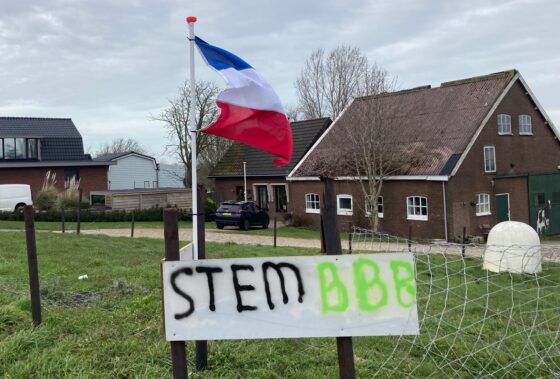

Photo: DutchNews.nl
The dominance of the pro-farmer BoerBurgerBeweging in the provincial elections is now raising questions about the likely impact on the government’s strategy to combat nitrogen pollution, which was one of the big issues in the campaign.
BBB is now confirmed to be the biggest party in all 12 provinces, including Utrecht, where the party was in a neck and neck race with GroenLinks.
Farmers party BBB steamrollers the elections
GroenLinks still dominates in the bigger cities
Rutte insists his coalition will survive
How the powerful senate eclipsed the provinces
It now seems likely that BBB will have 16 seats when provincial councillors vote in the senate elections in May, while the combination of GroenLinks and the PvdA will have 15.
But the tentative projections do suggest the current coalition can put together a majority with the help of GroenLinks and the PvdA and sideline the BBB when it comes to controversial issues – such as tackling emissions.
Since the Council of State ruled in 2019 that the government was bound by the limits provinces have been unable to issue environmental permits for large-scale projects such as housing developments, motorways and port facilities.
But farming is also responsible for a large part of the problem, and BBB leader Caroline van der Plas and her regional party leaders have said repeatedly that compulsory farm buyouts – as the government has mooted – are absolutely not an option. The BBB is also opposed to the government’s commitment to slash nitrogen compound emissions by 50% by 2030.
What next?
Both these approaches potentially set the party on a collision course with the Dutch legal system and the EU. But now BBB has successfully capitalised on the mass protests in rural communities it must show a constructive face, such is the nature of Dutch coalition politics.
Work will now start on putting together the 12 provincial governments and that going to be a tricky task given the large number of parties. Even with 17 seats in Drenthe, the BBB will need a partner to form a stable coalition.
The Volkskrant points out that unlike four years ago when Forum voor Democratie was the big winner, most parties have not ruled out forming a coalition with the BBB.
In both Drenthe and Overijssel, for example, a combination of BBB, VVD and CDA would be enough to form a majority, but that would pose a major headache for the government, pitting province against national government on the nitrogen issue.
More than nitrogen
Van der Plas has also insisted that her party is about more than nitrogen. For example, it sides with the VVD and CDA in calling for refugees to remain ‘in the region’, and says they should go through a civil integration process before being allocated a home.
‘Immigrants who do not come from a war zone or whose livelihoods and families are not under serious threat must be able to demonstrate that they have permanent work and accommodation in the Netherlands,’ the party website states.
‘If they can prove this and have a good command of the Dutch language, they will be admitted. After five years of contributing to Dutch society and economy, they may be eligible for a permanent residence permit.’
Housing
In terms of housing, the party wants to see more affordable housing and moves to encourage high earners to leave social housing. It supports the development of more high rise in urban areas and opposes building on ‘good agricultural land’.
The party does back higher tax on short haul flights, opposes offshore wind farms, and believes in stimulating European train travel with an ‘improved railway network and realistic price for plane tickets’. It also supports measures to support rural schools, a basic grant for all students, a single health insurance system for everyone and free menstrual products for all women.
A Nexit is not on the cards, but the BBB says the European Union should be a common market, not a super state. The party has registered a European version of its name with one eye on next year’s EU elections. It also backs the concept of a southern and a northern euro to end what it calls the ‘undesirable practice’ whereby the north bails out the south.
Discrimination
Closer to home, one of its more unusual policies is the call for a more consistent policy on television subtitling. ‘Often conversations on television with people from the countryside (Limburgers, Tukkers, Frisians, Brabanders, etc.) are subtitled as standard,’ the website states.
‘BBB considers this discriminatory. BBB wants all dialects on television, rural and suburban, in which no standard Dutch is spoken, to be subtitled. And that includes if someone speaks with an Amsterdam, Hague, Rotterdam, Gooise or Utrecht accent. The same rule for everyone.’


